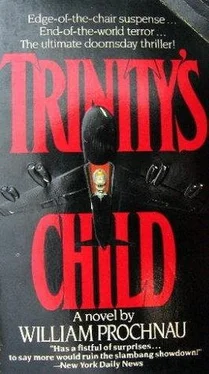“General?”
Alice did not appear to hear the voice.
“General. Excuse me, sir.”
He turned slowly and looked into the worried but determined face of the communications officer.
“General, I’ve got Olney again. It’s important.”
Alice ran a beefy hand slowly up his cheeks, gouging, until the fingers squeezed at his eyes. “Damn you, lieutenant,” he said with quiet desperation. He could feel the shadow of the E-4 at his back.
“Sir, it’s the President.”
Alice dropped his hand abruptly and stared at her in confusion. “Condor?”
“No, sir,” she replied. “The President.”
“I don’t understand,” he said slowly.
“I don’t understand either, sir. But I have the President on the radiophone. The President. He says it’s urgent.”
Alice turned away and looked out the cockpit window. They were closing methodically on the E-4, its towering tail fin seeming to inch toward them. “Break it off, Smitty,” he said. Then he added, as he left the cockpit: “Don’t let him stray far.”
The F-18 Hornets were on them quickly, one off each wingtip so snugly they almost scraped metal. Sidewinder missiles, far superior to the Soviet ACRID’s they had evaded over the Arctic, were slung under the wings and tucked tightly near the fuselage of the crack Navy fighter-interceptors. But Kazaklis and Moreau knew the Hornets would not need their missiles to make a fatal sting. Old-fashioned bullets—a quick chug-a-chug-a from the Gatling guns in their white needle noses—would bring the Buff down now. They would not even see it coming. Since Halupalai’s ejection, they not only were crippled and defenseless but they had no vision to the rear of the airplane.
Kazaklis swept his eyes across the horizon. The storm was closing in on three sides. But it still lay miles distant and out of immediate reach. He also knew the storm was a dubious haven, that it could prove as fatal to the wounded bomber as the lacing they would get from the made-in-the-U.S.A. machine guns. He turned his gaze back toward the Hornet hovering only a few feet off his wingtip. The fighter tipped its wings like kayak paddles in the universal signal to come down or be taken down. Kazaklis could see the pilot clearly, being not much more than one hundred feet away. He was fuzz-faced in his white helmet, barely out of college, and much younger than Kazaklis. Join the Navy and see the world, Kazaklis thought grimly. The carrier pilot signaled Kazaklis flamboyantly, his gloved hand raised high, the thumb pumping down, down, down.
Kazaklis grinned. “I think that boy’s serious, Moreau.”
“Jesus Christ, Kazaklis,” Moreau shot back, “sometimes I wish your brain were as active as your prick.”
“I’m surrounded by hostile forces, threatening from the outside and boring from within,” he replied, still grinning.
“Knock it off.”
“What the hell do you want me to do? Wave my meat out the window at ’em? You think they’d die of envy?”
Moreau looked at him in dismay, desperately trying to suppress a smile. “Die of laughter, more like it,” she said. “The Navy’s not intimidated by four-inch guns, Kazaklis.”
Kazaklis swiveled his head abruptly toward Moreau, his eyes futilely trying to feign outraged indignation. Instead, he broke into giddy laughter. Moreau began laughing too. Suddenly the cockpit was filled with uproarious, convulsive laughter, the two of them giving way to the exhaustion and hopelessness, venting the repressed fear and loss, easing the incredible tension. The release lasted only a moment. Out of the corner of his eye, Kazakhs caught the First glimpse of the F-18 spitting fire into the emptiness in front of them, clearing its weapons in one final warning.
“I’d say that boy’s very serious,” Kazakhs said, the laughter gone, the eyes glued on the blue-and-white fighter still hovering just forward of his wingtip.
Moreau also had abruptly stopped laughing. “Okay,” she said, “so what do we do? Put it down?”
Kazakhs gazed down into the ocean. The carrier was behind them, nowhere in sight. “No,” he said. “No, I’m not going that way. Hauled out of the drink by some eager-beaver rescue team on their last drill, plopped down on the deck, grilled by naval intelligence. Then slammed into the brig until some Rus-sky submarine commander pops a couple of kilotons into the hull. No, thanks. That big baby won’t make it through the day. Surprised she made it through the night.”
Out the lefthand window, the young Hornet pilot gestured toward his face mask. “He wants to talk to us,” Kazakhs said. “You think he wants to negotiate?”
“Mmmmm,” Moreau grunted.
Kazakhs flicked on the radio, searching the bands until he found them.
“Air Force Zero-Two-Six-Six-Four…” the radio crackled.
“That’s us, pal,” Kazakhs replied. “Our friends call us Polar Bear.”
“Okay, smart-ass,” the fighter pilot snapped back, “our orders are to bring you down or shoot you down. Do you understand?”
“Already got that message, buddy. I think we’ll stay up. My friend here’s afraid of sharks.”
“Roger, Zero-Two-Six-Six-Four. Your choice. You know what a Sidewinder will do to that beat-up crate of yours?”
“Come off it, sailor. You don’t need a missile. Save your heavy stuff for the bad guys.” Kazakhs paused, turning on his little-boy-amazed voice. “You know I got a lady in the right-hand seat?” He could hear Moreau’s groan over the sound of the engines. “Puttin’ all that lead in a lady. Now, that’s hard to stomach, huh?”
“Bring you down or shoot you down,” the radio crackled again. “Your choice, flyboy.”
“Hokay, sailor, we sure do understand your problem, ha vin’ orders and all,” Kazaklis drawled. “Lemme make it a little easier for you. Now, our navigator’s dead, and our radar man’s dead, poor souls. That means we can’t see out the back of the airplane. Our EWO’s dead, nice guy he was, too. That means we can’t send out decoys, as if they’d do some good. Our gunner’s dead, and he was the crème de la crème” —Kazaklis glanced at Moreau, grinning; you like my French, Josephine?—“and that means we couldn’t shoot at you even if we could see you. Now, we also got a hole about three feet square in the top of this gem of SAC’s mighty fleet, and that means we can’t go for altitude. So, with the benefit of all that priceless intelligence, why don’t you fellas just wheel around and pump a few rounds into us, not wastin’ too many?” He stared into the face of the Navy pilot. Then Kazaklis theatrically gestured toward Moreau. “You want to say good-bye to the lady?”
The Navy pilots stared briefly into the cockpit of the B-52. A voice echoed out of the F-18 off Moreau’s wing. “We don’t want to do this, buddy.” Then, in unison, the two fighters peeled off into their turns for the loop around that would bring them back in for the kill.
“So much for that,” Kazaklis said.
“Good God, man,” Moreau said, shaking her head in amazement, “is that how you racked up all those scores in the Boom-Boom Room?”
“Wel-l-l-l,” Kazaklis drawled, “in the Boom-Boom Room the four-inch gun helped.”
“Alice here.”
Sweat poured off the general, soaking through his clothing. He had steeled himself, the way a strong man does, for the ultimate moment. If the last-minute reprieve was a blessing, his bodily functions did not accept it. The tension release had been too sudden. All his systems seemed ready to fail now, almost as surely as they would have flooded in release with the snap-lock opening of a hangman’s trapdoor. His hand shook, his breathing came in short gasps, his voice quavered, or so it seemed to him, and he was certain that was why he received no instant reply.
Читать дальше












